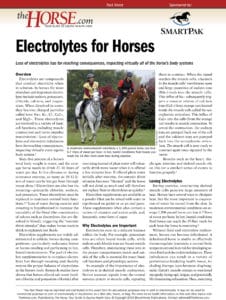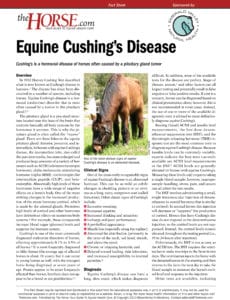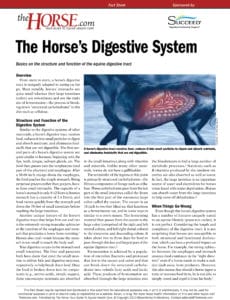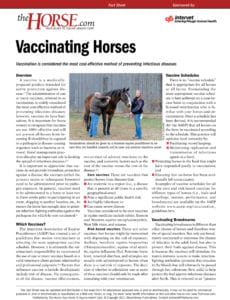Pigeon Fever Found in Florida Horses
Traditionally considered a West Coast disease, pigeon fever was recently diagnosed in several Florida horses. Pigeon fever is caused by the bacterium Corynebacterium pseudotuberculosis, which tends to live in the soil in hot, dry environments. It is primarily spread by flies and causes abscesses on the pectoral region that give a horse a “ Read More
Collagen Shown More Effective for Arthritic Horses
Not only is the joint supplement ingredient type II collagen effective for arthritic horses, it also may be more effective than glucosamine and chondroitin sulfate.
Tapeworm-Colic Link Discovered
At long last, evidence supporting a link between the equine tapeworm Anoplocephala perfoliata and colic in horses was identified by a group of Italian researchers from the Universita degli Studi di Perugia.
Earlier thought held that A. perfoliata did not actually cause disease in horses, but that the parasites were simply an incidental finding in horses’ guts
Hydration and Electrolyte Depletion a Continual Challenge
Hydration and electrolyte depletion remain important factors to consider in endurance horses. Yet the impact of electrolyte supplementation on performance remains unclear and potential side effects may exist, relayed Harold Schott II, MS, DVM, PhD, Dipl. ACVIM, a professor at Michigan State University’s College of Veterinary Medicine at the 2010 Kentucky Equine Research Nutrition Confere
Mutation Causing Lavender Foal Syndrome Identified
A mutation in the gene called myosin Va (MYO5A) is responsible for Lavender Foal Syndrome (LFS), reported a group of researchers from Cornell University and The Maxwell H. Gluck Equine Research Center.
Equine Nutritionists Help Assure Proper Feeding
Since much decision-making about feeding horses continues to be based on folklore, tradition, and misinformation, owners and trainers are encouraged to use nutrition resources, reported Olivia Martin at the 2010 Kentucky Equine Research Nutrition Conference held April 26-27. Martin operates the independent equine nutrition consulting firm Performance Feeding Inc. and supplies feeding a
Diarrhea a Side Effect of Antibiotic Administration
Any antibiotic administered orally, intramuscularly, or intravenously can theoretically cause acute diarrhea; however, some antibiotics are more likely than others to upset a horse’s gastrointestinal tract.
Antioxidants Beneficial if Not Overdone
Antioxidants like vitamins E and C are beneficial to exercising horses, but only at recommended levels, reported Carey Williams, PhD, equine extension specialist and associate director of the Rutgers University Equine Science Center. Williams presented this information in her talk titled “Antioxidant Research and Its Application to Feeding Horses” at the 2010 Kentucky Equine Resear

Electrolytes
Loss of electrolytes has far-reaching consequences, impacting virtually all of the horse’s body systems.
Nutrition Can Help Manage Tying-Up in Sport Horses
Thanks to advances in identifying specific causes of tying-up, development of diagnostic tests, and improved recognition of the impact of diet and exercise on horses that tie up, affected horses can be successfully managed. Stephanie Valberg, DVM, PhD, professor of large animal medicine and director of the University of Minnesota’s Equine Center, relayed this message during her talk &quo
Cornell Develops Model to Study Leptospira interrogans in Horses
Cornell University researchers have successfully created a model in horses to study infections caused by the bacterium Leptospira interrogans.
In horses, leptospirosis can cause fever, icterus (jaundice), uveitis and recurrent uveitis, abortion, and kidney failure, though clinical signs are variable.
PreveNile West Nile Virus Vaccine Recalled
In a letter to veterinarians dated April 28, Brett Whitehead, Director, Equine and Ag Retail Business, of Intervet Schering-Plough Animal Health, encouraged practitioners to return all PreveNile vaccine. The recall was initiated after an increased incidence in the number of adverse events following vaccination with currently marketed serials of PreveNile.
The company noted in the
Cecal Impaction: Surgery Can Make a Difference
Horses with life-threatening cecal impactions only have a fair prognosis after surgery, but those that survive to discharge have a good prognosis, reported a group of veterinarians led by Lewis C.R. Smith, BVetMed, CertES(Orth), MRCVS, from Rossdales Equine Hospital in the United Kingdom. Cecal impactions are not particularly common–they represent only 5% of all large intestinal

Equine Cushing’s Disease
Know the facts of Equine Cushing’s, a hormonal disease in horses often linked to a pituitary gland tumor. Included in this fact sheet are an overview of the disease, clinical signs, diagnosis, treatment, and prognosis for future health.

The Horse’s Digestive System
The horse’s digestive system is large, complex, and functions like a factory, yet it is exceedingly delicate. Digestive tract dysfunction in the horse is an important concern for owners and veterinarians.

Vaccinating Horses
Vaccinating horses is generally considered to be the most cost-effective method of preventing infectious diseases; however, vaccines do have limitations.












